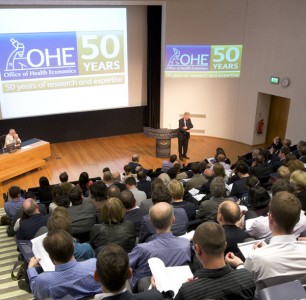Professor Alan Maynard of the University of York, who will speak on Contracting for Quality in the NHS: Putting the Francis Report in Perspective. Last year's…
Professor Alan Maynard of the University of York, who will speak on Contracting for Quality in the NHS: Putting the Francis Report in Perspective.
 Last year's annual lecture
Last year's annual lecture
On the evening of 16 July 2013, OHE will welcome Professor Alan Maynard of the University of York, who will speak on Contracting for Quality in the NHS: Putting the Francis Report in Perspective. His summary of the focus of the lecture follows.
The report of the Independent Inquiry into Care provided by the Mid-Staffordshire NHS Foundation Trust offers a depressing insight into the quality of care in parts of the NHS. Robert Francis QC recommended a number of unevidenced interventions, which focus on increased regulation.
What insight can we gain into NHS quality from an economic perspective? Since the 1991 NHS reforms, there has been potential for an active contracting process, but this opportunity has largely been ignored. Commissioners of health care in the NHS, like those in the private sector, have tended to be passive, accepting the quality of care provided in primary care and hospitals with little challenge.
Incentives for quality health care provision in today’s NHS are muted. Traditionally, NHS managers have been rewarded for controlling expenditure rather than ensuring quality. This focus on cost has led at times to clashes between managers and clinical professionals with managers taking the blame when NHS care has been found inadequate. Policy efforts to improve quality have tended to involve considerable expenditure increases. ‘Quality’ care of course has to take into account both costs and outcomes; in current austere financial times, the chances of increased expenditure are slim.
In this lecture, the roles of incentives and regulation in NHS contracts will be explored. In a context of severely constrained budgets, how can we design and enforce contracts that ensure good quality NHS care?
Professor Alan Maynard began his career at the University of Exeter (1968–71) as an assistant lecturer and lecturer in Economics. Between 1971 and 1977, he lectured in Economics in the Department of Economics and Related Studies, University of York, where he later was Founding Director of the Graduate Course in Health Economics and Founding Director of the Centre for Health Economics. Prof Maynard currently is Professor of Health Economics in the Department of Health Sciences at the University of York.
Prof Maynard has been involved in NHS management since 1983, initially as a non-executive director and subsequently as Chair of the York Hospitals NHS Foundation Trust (1997-2010). Currently, he is Lay Chair of the Vale of York Clinical Commissioning Group.
Prof Maynard’s work extends well beyond the UK: he has worked as a consultant for the World Bank, the World Health Organisation, the European Union and the UK Department for International Development in two dozen countries.
A Fellow of the Academy of Medical Sciences, Prof Maynard also has honorary doctorates from the Universities of Aberdeen and Northumbria. He was awarded the OBE for services to the NHS in 2009.
Editor's note, 18 June: The event is now fully booked and registration is closed. We thank you for your interest!